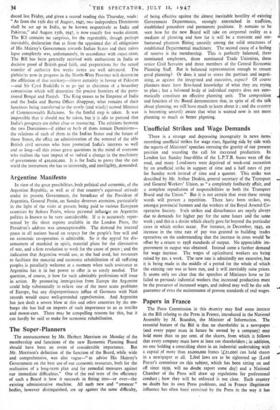Unofficial Strikes and Wage Demands
There is a strange and depressing incongruity in news items recording unofficial strikes for wage rises, figuring side by side with the reports of Ministers' speeches stressing the gravity of our present position and sounding the call for increased production. In London last Sunday four-fifths of tfie L.P.T.B. buses were off the road, and many Londoners were deprived of week-end recreation by an unofficial strike in support of time and a -half rates of pay for Sunday work instead of time and a quarter. This strike was described by Mr. Arthur Deakin, general secretary of the Transport and General Workers' Union, as " a completely foolhardy affair, and a complete repudiation of responsibilities to both the Transport Board and the Union." But it is not certain that even these strong words will prevent a repetition. There have been strikes, too, amongst provincial busmen and the workers of the Royal Arsenal Co- operative Society. Such strikes and disturbances are nearly always due to demands for higher pay for the same hours and the same work ; and this is a desire which clearly, goes far beyond the particular cases in which strikes occur. For instance, in December, 1945, an increase in the time rate of pay was granted to building trades operatives on the understanding that the increase in costs would be offset by a return to 1938 standards of output. No appreciable im- provement in output was obtained. Instead came a further demand for wage increase. The wages of agrigiltural workers are being raised by 'Os. a week. The new rate is admittedly not excessive, but it is being made in the middle of a period for the whole of which the existing rate was to have run, and it will inevitably raise prices. It seems only too clear that the speeches of Ministers have so far failed to persuade industrial workers that increased production must be the precursor of increased wages, and indeed may well be the sole guarantee of even the maintenance of present standards of real wages.


































 Previous page
Previous page